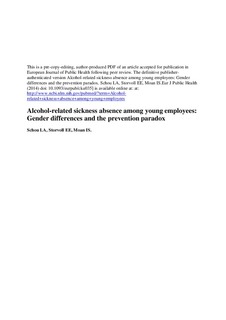Alcohol-related sickness absence among young employees: Gender differences and the prevention paradox
Journal article
Permanent lenke
http://hdl.handle.net/11250/297756Utgivelsesdato
2014Metadata
Vis full innførselSamlinger
Sammendrag
Few studies have examined alcohol-related sickness absence among young employees, although young adults are known to drink quite heavily. There are substantial differences in drinking patterns between men and women, yet gender differences have rarely been the main focus in research on alcohol-related sickness absence. Thus the present paper aims to examine gender differences in the prevalence of alcohol-related sickness absence among young employees in Norway, and in the associations between drinking patterns and such absence. Further, to examine whether the prevention paradox applies to alcohol-related sickness absence among both genders.
A sample of employed young adults, 49.7% male (N = 1762, mean age = 28.3; SD = 1.9), was obtained from a general population survey of Norwegians. Self-reported measures on alcohol-related sickness absence and various drinking measures were applied.
Men reported absence from work due to drinking almost twice as often as women. There was a statistically significant gender difference in the drinking–absence association only for one of the three alcohol measures, indicating a stronger relationship among women. The heaviest drinkers (about 6% of the sample) reported a disproportionally large share of alcohol-related sickness absence (19%), yet the vast majority of such absence was found among the moderate drinkers (81%).
Alcohol-related sickness absence is more common among men than women. This gender difference may reflect differences in drinking habits rather than the likelihood of being absent after drinking. The results indicate that the prevention paradox applies to alcohol-related sickness absence among young employees of both genders. Studien har undersøkt selvrapportert alkoholrelatert sykefravær blant 1700 arbeidstagere med en gjennomsnittsalder på 28 år.
Unge menn har nesten dobbelt så mye alkoholrelatert sykefravær som unge kvinner.
Åtte prosent av de spurte fortalte at de hadde vært borte fra jobben minst en gang siste år.
Enslige unge menn var oftest borte fra jobben på grunn av alkohol. Unge menn som var gifte eller samboere hadde i mindre grad slikt fravær.
Personene som drakk mest (6 prosent av utvalget) stod for en uforholdsmessig stor andel av sykefraværet (19 prosent). Likevel fant forskerne at mesteparten av fraværet (81 prosent) var blant personer som drakk moderat.
Funnene innebærer at det kan være hensiktsmessig å rette forebyggende tiltak mot alle arbeidstagere, ikke bare mot dem som drikker mest.
Beskrivelse
-
